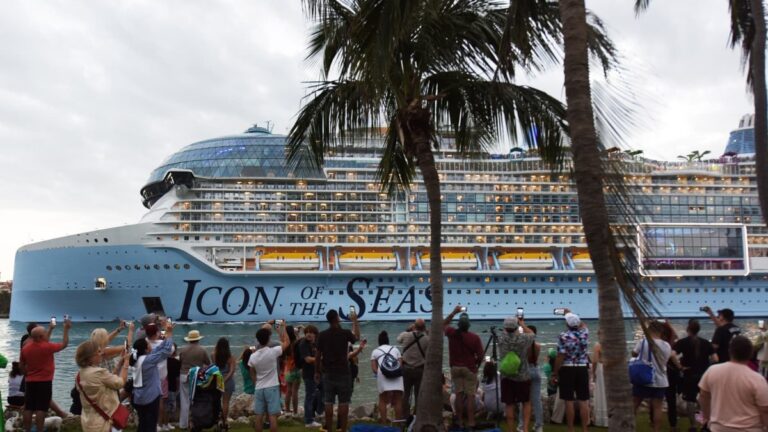- As travel demand surges, Royal Caribbean is betting it will attract more customers by shortening trips and filling days with activities and special opportunities.
- The cruise company will launch Utopia, the world’s second largest cruise ship with a maximum capacity of approximately 5,800 passengers, which will feature a variety of amenities including 13 swimming pools, 21 dining options and two casinos.
- “There is no area on the ship where we have seen a change in guest spending behavior,” CEO Jason Liberty told CNBC.
As cruise lines struggle to capture American travel budgets as consumers become more selective about how and where they vacation, Royal Caribbean believes it can keep customers coming back by shortening trips and cramming them with activities and special occasions.
“I think we’re very experience-driven,” Royal Caribbean CEO Jason Liberty told CNBC’s “Squawk on the Street” this week. “More than half of our guests are millennials or younger, and when we survey those guests, about 42 percent say they’re planning a short vacation trip in the next 12 months.”
Royal Caribbean’s Utopia is the world’s second-largest cruise ship, with a maximum capacity of about 5,800 passengers, and offers a variety of amenities, including 13 pools, 21 dining options, and two casinos. This is Royal Caribbean’s second cruise ship to be launched in six months. Liberty says strong demand for cruises after the pandemic has not slowed.
“We are not seeing any pullbacks from consumers, such as pushing vacation plans further out…” [or] “Then, while on board, guests continue to go out and spend,” Liberty said. “We have not observed any areas on board where we have seen a change in guest spending behavior.”
To grow its business and broaden its appeal, Royal Caribbean is looking for ways to better compete with other types of vacations customers choose, such as skiing, casinos and theme parks.
“When we look at what our guests are doing when they’re not on board our ships, they’re going to Orlando, they’re going to Las Vegas, they’re going to all-inclusive resorts,” Liberty said. “Our goal is to make sure that our experiences, whether they’re on board our ships or on one of our private islands, are competitive with land-based vacations.”
Jamie Katz, a travel and leisure analyst at Morningstar, thinks Liberty’s strategy to lure Disney theme park tourists has been successful.
“American travelers don’t always have time for six- to eight-day cruises because of their work schedules or their kids’ school schedules,” Katz said. “Three-day cruises give customers more options.”
Expansion Plans
One advantage of bringing a new vessel to the market is the ability to charge higher rates.
“We’re seeing a significant price premium. Historically, new ships have been priced 20 percent higher than existing ships across the industry,” said Patrick Scholes, travel and leisure analyst at Truist Securities.
Scholes said price increases for Royal Caribbean’s Utopia could be even higher.
Liberty said it expects price hikes to continue into the second half of the year, pointing to the “value gap” between cruises and land-based vacations.
Rival Carnival has also raised prices due to strong demand.
“We’re not seeing any signs of spending slowing down. In fact, it’s accelerating,” CEO Josh Weinstein told CNBC after the company’s most recent earnings report in mid-June.
Analysts say cruises are one of the few segments of the travel and hospitality industry where prices continue to soar. Last week, Delta Air Lines said its prices were falling compared to last year. Analysts at HSBC expect airfares to remain flat or fall in 2024 compared to 2023.
Several analysts and investors are scheduled to board Utopia of the Seas this week to get a better understanding of what sets the ship apart from its competitors.
One area of interest is the impact of cutting-edge technology: Liberty says artificial intelligence has helped Utopia reduce food waste by 30-40 percent. The company is also using AI for dynamic pricing and smarter management of customer data.
Other than Utopia, there aren’t many ships from the major cruise lines.
Royal Caribbean currently has one of the strongest backlogs in the industry, and its Icon of the Seas, the world’s largest cruise ship with a capacity of 7,600 guests, made waves earlier this year.
During Royal Caribbean’s recent earnings call, executives said bookings for Icon will remain strong through 2025.
“We are entering a period of minimal ship launches over the next two to three years. Typically the industry sees supply growing by 5 to 7 percent per year,” Scholes said.
But building a giant cruise ship is a massive undertaking: Wall Street analysts estimate it could take three to five years from ordering to delivery.
Norwegian Cruise Line is moving forward with plans to bring eight new ships to market over the next six years.
Viking Cruises, which went public earlier this year and whose shares are trading well above its IPO price, plans to bring three new ocean cruise ships to market over the next three years, excluding river vessels.


